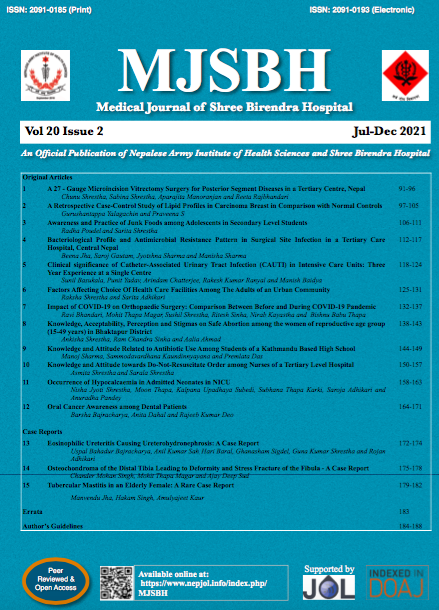Occurrence of Hypocalcaemia in Admitted Neonates in NICU
DOI:
https://doi.org/10.3126/mjsbh.v20i2.35505Keywords:
Hypovitaminosis D; Late onset Hypocalcaemia; NeonatesAbstract
Introduction: Hypocalcaemia is common metabolic manifestation in neonates and associated with both maternal and foetal conditions. Hypocalcaemia is labeled if term neonate’s total serum calcium is < 8 mg/dl and preterm has < 7 mg/dl. Association of neonatal and maternal hypovitaminosis D is very common. .
Methods: One year retrospective study was conducted in a tertiary level private children hospital of Kathmandu, Nepal from 2018 June to 2019 July. Total 299 cases were selected and serum calcium were sent and analysed for its association with illness, associated maternal hypovitaminosis D and other relevant maternal tests.
Result: Among 686 NICU cases, calcium level was sent for 299 cases. Among these, 254 were term and 45 were preterm babies and male to female ratio was 4:1. Mean calcium in term babies were 8.6 mg/dl and in preterm it was 8.1 mg/dl. Hypocalcaemia was found in 19% of cases with mean calcium level was 7.1 ± 0.84 mg/dl and severe hypocalcaemia accounted for 12%. There was no significant presence of hypocalcaemia in relation to gestation of newborn (p value 0.798). We found higher incidence of late onset hypocalcemia than early onset hypocalcemia but was not of statistical significance (p value 0.771). Associated disease were perinatal asphyxia, congenital heart diseases and prematurity. Among 27 late onset hypocalcaemia, 22% had hypovitaminosis D both in neonates and mother.
Conclusions: Neonatal hypocalcaemia is a common condition associated with sick newborns. In late hypocalcaemia both newborn and mother should be screened for associated lab tests like vitamin D, magnesium, PTH as there may be association between the two.
Downloads
Downloads
Published
How to Cite
Issue
Section
License
Copyright (c) 2021 Medical Journal of Shree Birendra Hospital

This work is licensed under a Creative Commons Attribution-NonCommercial-NoDerivatives 4.0 International License.
This license enables reusers to distribute, remix, adapt, and build upon the material in any medium or format for noncommercial purposes only, and only so long as attribution is given to the creator.




